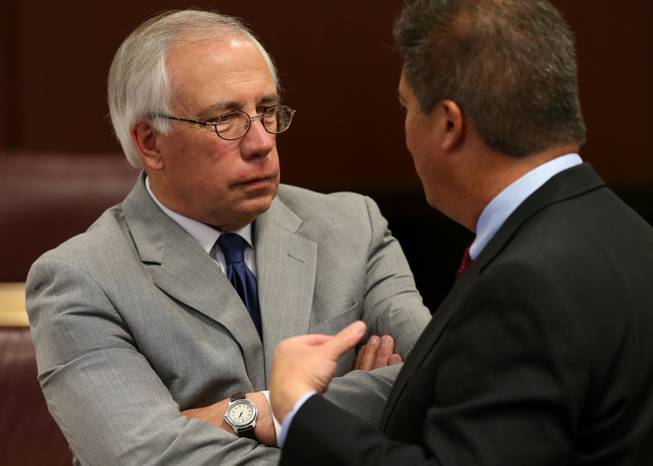
Cathleen Allison / AP
Nevada Assembly Minority Leader Pat Hickey, R-Reno, left, talks with lobbyist Rocky Finseth at the Legislative Building Carson City on Tuesday, May 7, 2013.
Thursday, Sept. 26, 2013 | 4:27 p.m.
Assembly Minority Leader Pat Hickey handed Democrats a neatly packed petard to use against him this week when he seemingly cheered the fact that minority and young voters would sit out next year’s election to the benefit of Republican candidates.
Trying to make the case that Republicans generally perform well in mid-term elections when a Democrat is in the White House, Hickey told a Reno radio host that 2014 would be a big year for the GOP.
“We have some real opportunities in 2014,” Hickey said. “This is a great year in an off-presidential election, with seemingly no Democrat on the top of the ticket against (Gov. Brian) Sandoval. No Harry Reid. Where we had a million voters turn out in 2012, we’ll have like 700,000. A lot of minorities, a lot of younger people will not turn out in a nonpresidential year. It’s a great year for Republicans.”
The comment opened Hickey up to accusations from Democrats that he is “out of touch” and trying to suppress the vote — attacks they made within moments of the interview on Tuesday.
But was Hickey’s analysis right? Will fewer minorities and younger voters visit the polls next year and is that a good thing for Republicans?
The answer: Probably, but not necessarily.
If Hickey were a political scientist delivering an analysis of the 2014 political landscape, his remarks likely wouldn’t have attracted so much attention.
Traditionally, mid-term elections generate lower turnout without a presidential campaign working to get voters to the polls. Traditionally, minority voters and younger voters — who vote heavily for Democrats — are among the most difficult to turn out, especially in a mid-term election.
And, traditionally, Republicans benefit more under those conditions because inveterate voters such as senior citizens generally swing to the GOP.
But the political landscape is changing — particularly in Nevada.
Where Hickey may have been right about younger voters staying home next year, Hispanic voters are not a diminishing force in Nevada elections. Over the last decade, the Hispanic share of the electorate has grown from about 12 to 18 percent, according to a study done by Brookings Mountain West. Exit polls show Republicans typically win 25 to 30 percent of the Hispanic vote. Other polls show the share may be much lower.
And while Hispanic turnout decreases in mid-term elections, so does turnout overall.
“Obviously, we do have a drop-off in the Hispanic vote for mid-term elections, but it drops off for everybody,” said David Damore, a political scientist with UNLV and an author of the Brookings Mountain West study. “So it’s really about the relative drop-off. If we look in 2010, the Latino share is the same as it was 2008.”
In other words, the overall pie is smaller, but the Hispanic slice of the pie is about the same size regardless of whether it’s a presidential year. That means the voting block's relative influence is also about the same.
That said, the dynamics at play on the 2014 ballot could further reduce Hispanic turnout. In 2010, U.S. Sen. Harry Reid was fighting for his political life and waged a campaign akin to a presidential campaign. Reid, also, was particularly focused on the Hispanic vote.
Next year, there is no U.S. Senate race on the ballot. At the top of the ticket is the governor’s race and so far no Democrat has decided to take on Gov. Brian Sandoval, a popular Republican.
On the flip side, however, the fate of comprehensive immigration reform, could galvanize Hispanic voters, particularly if the reform bill dies in the Republican-controlled House, Democrats argue.
“The big wild card is comprehensive immigration reform,” Damore said. “There’s an opportunity for Republicans up and down the ticket to put that issue behind them, but it doesn’t look like that’s going to happen any time soon.”
Still, Hickey’s comments didn’t provoke only his political detractors. Leading officials in his own party called him out, including Sandoval, Sen. Dean Heller and state Senate Minority Leader Michael Roberson.
“Recent comments from Assemblyman Hickey are divisive, insensitive and run counter to the basic duties an honor of public service,” Heller said in a statement. “Assemblyman Hickey should know that it is a privilege to represent Nevada’s many cultures and ethnicities.”
Sandoval, whose campaign has set a high-bar goal of winning 50 percent of the Hispanic voter, also disavowed the comments.
“Pat’s comments do not reflect my views and he should reconsider them,” Sandoval said in a statement.
The pointed chastisement is an indication Republicans are acknowledging the importance of the Hispanic voting block.
Hickey, who initially described the Democratic response as “gotcha politics,” ultimately decided to apologize for the remarks.
“I am sorry about my recent comments and regret I made them,” Hickey said Thursday afternoon. “It was not my intention to alienate anyone, but I did misspeak, plain and simple and for that I apologize.
“I agree with Gov. Sandoval that Republicans must earn the trust and confidence of all Nevadans. I look forward to working with the governor and my fellow Republicans in accomplishing just that.”

Join the Discussion:
Check this out for a full explanation of our conversion to the LiveFyre commenting system and instructions on how to sign up for an account.
Full comments policy